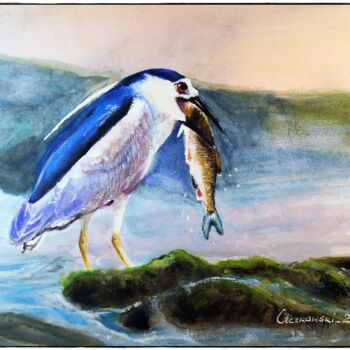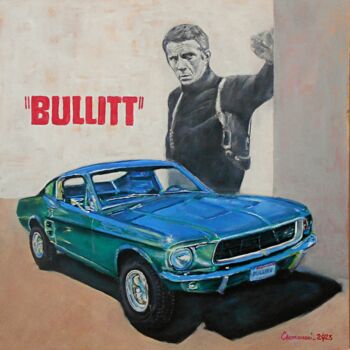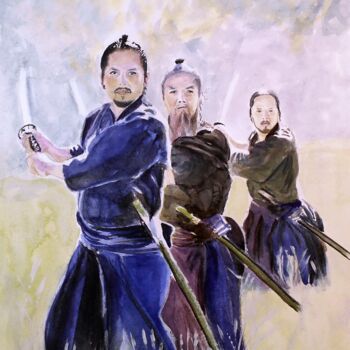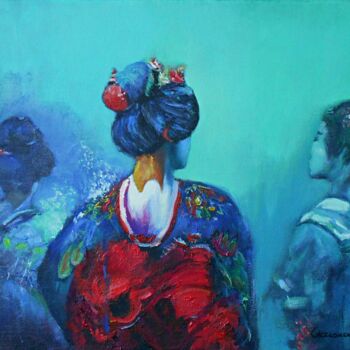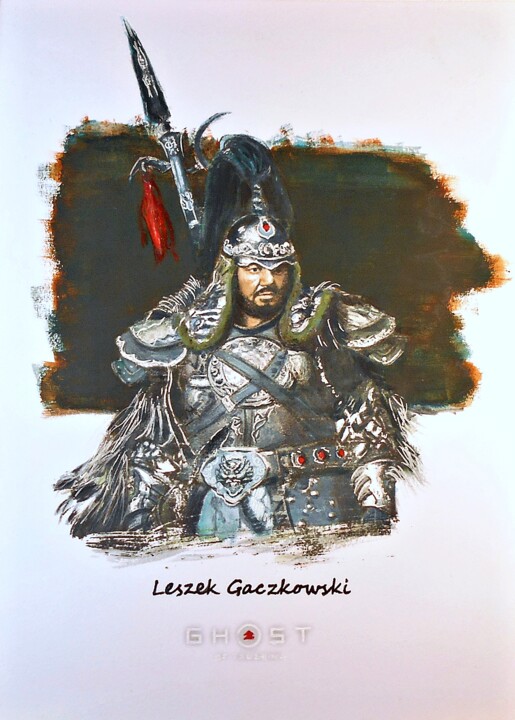
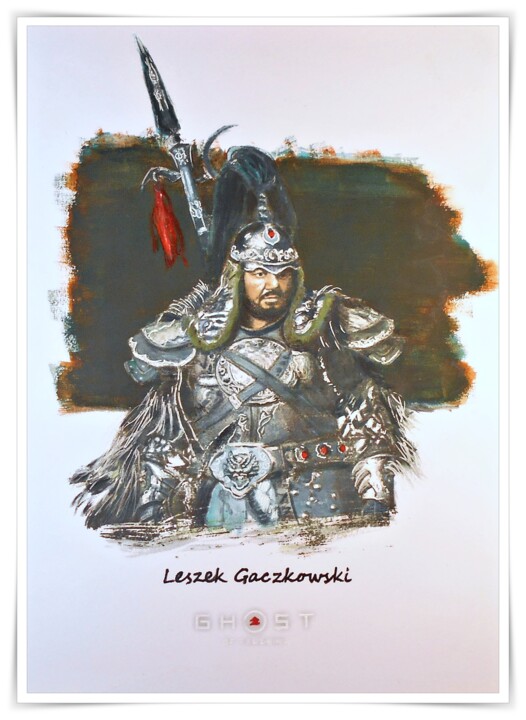
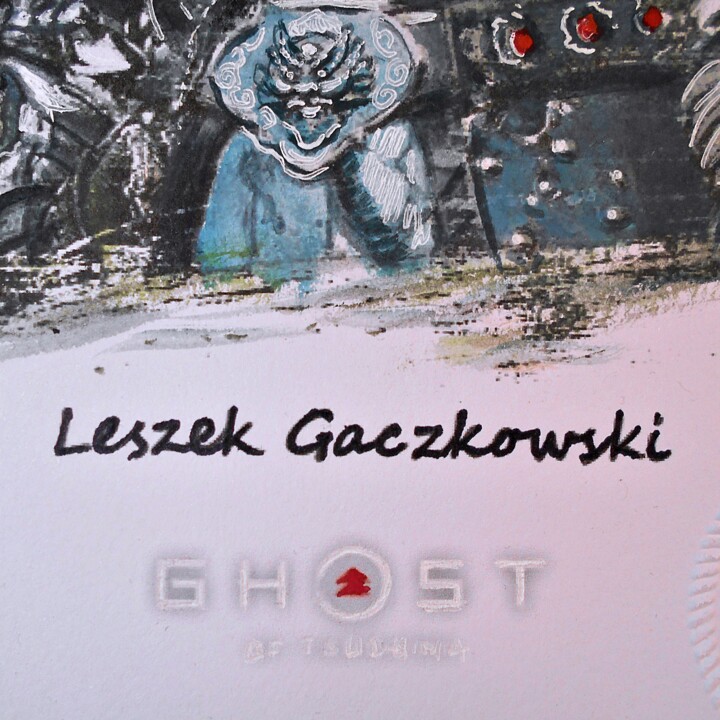
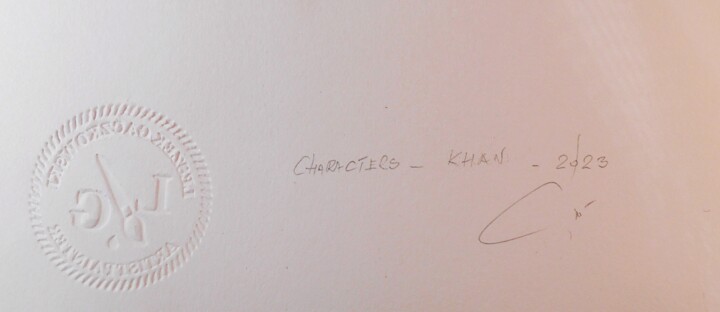


Let us know if you would like to see more photos of this artwork!
- Back of the work / Side of the work
- Details / Signature / Artwork's surface or texture
- Artwork in situation, Other...
GHOST OF TSUSHIMA 002 / 23 - CHARACTERS - Khan - (2023) (2023) Painting by Leszek Gaczkowski
More info
- Packaging (Box or cardboard packaging) All artworks are shipped with a premium carrier, carefully protected and insured.
- Tracking Order tracking until the parcel is delivered to the buyer. A tracking number will be provided so that you can follow the parcel in real-time.
- Delay Most packages are delivered worldwide within 1 to 3 weeks (Estimate)
- Customs not included The price does not include customs fees. Most countries have no import tax for original artworks, but you may have to pay the reduced VAT. Customs fees (if any) are to be calculated on arrival by the customs office and will be billed separately by the carrier.
More info
- Trackable Online Certificate of Authenticity Authenticity Certificates can be verified online at any moment by scanning the artwork code.
- Artist Value Certification Experts study the work and career of an artist then establish an independent and reliable average price value. The average price value situates the artist on a price range for a given period. The experts may also be asked to establish a more precise estimate for a particular work.
More info
100% secure payment with SSL certificate + 3D Secure.
More info
Sold by Leszek Gaczkowski
This image is available for download with a licence
Sold by Leszek Gaczkowski
-
Original Artwork (One Of A Kind)
Painting,
Gouache
on Paper
- Dimensions Height 11.7in, Width 8.3in
- Artwork's condition The artwork is in perfect condition
- Framing This artwork is not framed
- Categories Paintings under $500 Conceptual Art Video Game
Khotun Khan is a cousin of Kublai Khan and grandson of Genghis Khan. He grew up to be a very successful and well-known General in the Mongol Empire. But he originally grew up in China. Shortly before the Goryeo campaign, he released his favorite golden eagle, nicknamed Little Brother. Following the conquest of Goryeo, Khotun was engaged in a conquest of Japan. The Khan was eagerly ambitious, and if he was successful, he would not only spread his name but would be able to vie for the title of Great Khan himself. Before leading the invasion, Khotun learned the Japanese language and used spies and informants to learn about Japan's history, politics, and culture.
Khotun began his conquest of Japan by invading the island of Tsushima. Khotun set out for Tsushima with a large invasion force consisting of thousands of Mongols, including of one his best generals, Temuge, aboard a massive Mongol fleet that he intends to use to blockade the island.
The Khan and the Mongols made landfall at Komoda Beach, where they became involved in a standoff with the island's samurais, led by Shimura. and his nephew Sakai, Harunobu Adachi attempts to challenge the Khan to single combat, and he replies by lighting the Samurai on fire and beheading him, an act that knowingly insults the samurai code of bushido. This enraged Shimura into ordering a frontal charge, resulting in the decimation of the Samurai. Knowing that the jito is more valuable alive, Khotun captures him alive and reveals his identity to him, explaining how he had prepared for this invasion. The Khan knocks Shimura out when he silently refuses to surrender and takes him to Castle Kaneda. The castle is soon attacked by Lord Shimura's nephew Jin Sakai, who fights his way through the Mongols to rescue his uncle and confronts the Khan on the Castle's bridge. Jin challenges the Khan to single combat but is swiftly defeated. Khotun asks Jin to surrender, but when his face is cut by Jin, the Khan throws Jin from the bridge to the waters below.
Meanwhile, the Khan's forces advance across the isle, pillaging and destroying many settlements, temples, and garrisons and setting up camps and strongholds along the way. During this time, Khotun engages in frequent conversations with a local monk, Daizo, who seeks to document his words and deeds in order to foster mutual understanding and prevent more bloodshed, partially out of eagerness to learn more about Japanese culture and history. Khotun confides in the monk that he plans to convince Shimura to join the Mongol cause, and offer to make him Shogun and let him rule Japan as Khotun's right-hand man, as well as aiding Khotun in overthrowing Kublai.
Khotun makes several attempts to convince Shimura to join his cause, counting on Shimura's over-reliance on the traditions of the samurai. Shimura is unwilling to speak to the Khan until he learns that Jin survived the earlier confrontation with Khotun. Noting the love that Shimura has for his nephew, Khotun asks the jito if he will abandon his children to their savage demises at the hands of the Mongols, noting that surrendering could ensure their safety. Shimura responds that he and Lord Sakai will fight until their last breath. The next time Khotun visits the imprisoned Jito, he gives him an update on Jin's activities: his men have found their brothers stabbed in the back, a direct violation of the Samurai honor code, which Shimura had used to enforce the belief that Samurai and Mongols are different.
Shimura is in disbelief at Khotun's words, and he points out that war brings out the worst in all men. Khotun attempts to appeal to Shimura's fear that his nephew will become what he hates unless he joins his empire's fight for peace. Shimura counters that the Khan does not really want allies, but soldiers to overthrow the Shogun, and continues to refuse. Khotun leaves, though not before warning the ji that it is only a matter of time before it is too late for Jin and before he brings Shimura Jin's head. Khotun later makes one more visit to Shimura and informs him that Jin's dishonorable activities have increased to the point where he tears Mongols apart like a beast.
Shimura dismisses this by saying he's sure Khotun has done worse, leading Khotun to realize that Shimura still believes that they are different. Khotun argues that they fight for the same thing: a legacy that outlives them, which is in danger of falling apart thanks to his nephew becoming astray. Shimura counters that he won his legacy with duty and honor, by restoring order to his home, while firmly refusing Khotun's offer. Not regarding Shimura's cooperation as crucial to his designs for the mainland, he informs the jito that he is going to conquer his ancestral home, Castle Shimura, and leaves him to starve in this cell, alone and without honor.
In addition, Khotun receives word that Ryuzo and his Straw Hat Ronin are starving and have allied with Jin out of desperation. Khotun has his men treat some Straw Hat captives politely and is later able to bribe Ryuzo and the Straw Hats to join the Mongols against their own people, winning them over due to the Straw Hats' desperate need for supplies, as well as instilling the notion that the Mongols will win the war against the Japanese. When Jin launches his assault on Castle Kaneda to rescue his uncle, Khotun offers to give Ryuzo immediate food for his men if he is able to stop Jin. He fails, and Jin rescues his uncle and takes Castle Kaneda from the Mongols.
Displeased by Ryuzo's failure, Khotun withholds the food for his men and takes Ryuzo with him to conquer Castle Shimura. To atone for Castle Kaneda's loss, the Khan forces Ryuzo to burn a captive peasant alive outside Shimura Castle, coercing them into opening the gates and surrendering to the Mongols.[2] Khotun continues his conversations with Daizo inside Castle Shimura, which he explains is strategically more important than Castle Kaneda because it shields his forces in the frozen wilds of the north. Khotun is confident that his enemies will exhaust themselves fighting each other and the Mongols, and stock up on food, munitions, and supplies, intending to depart for the mainland when the time is right.
During this time, Khotun offers the eagle a deal to try to break Jin and make him into the killer Kouthan wants him to be he becomes increasingly fascinated with Jin after hearing about the Eagle's death at the hands of Jin who has half the island believing that he is a vengeful Samurai spirit. This belief increases after Jin kills kouthans right-hand man Temuge with the fearsome Ghost Stance, causing Khotun's men to believe that Jin, now known as the Ghost of Tsushima, is an invincible foe. Khotun sees an opportunity to divide the people, who adore the Ghost, from Lord Shimura and the other samurai. Following Temuge's death, Khotun decides that the Ghost has become too much of a problem and orders Ryuzo to put an end to him. However, Ryuzo convinces the Khan to give Jin a second chance. He lures Jin into a trap and captures him, along with his friend Taka, and leaves them tied to poles.
Khotun arrives not long afterward to meet with Jin once again. He points out how he and Jin are both survivors and draws comparisons to both of them, such as how live under the shadows of their elders; in Khotun's case, living up to his grandfather. He asks why they should settle for scraps when they have done enough to be legends. Khotun offers Jin amnesty if he surrenders and convinces his people to join the Mongols, reasoning that he could do it because of how much they admire him, but Jin refuses. Angered, Khotun unties Taka and hands him a katana, ordering him to kill Jin in exchange for his freedom. Taka attempts to attack Khotun, but Khotun easily subdues the blacksmith and beheads him to the horror of Jin. Khotun then leaves, intending to "find another" and make Jin choose again. Jin, however, manages to escape, swearing vengeance on the Khan and his allies.
Later on, as Jin and Lord Shimura prepare to launch an attack on Castle Shimura, Khotun speaks to Ryuzo and tells him that the Samurai's honor code makes them easy to break. However, the Ghost has become unpredictable, and this makes him dangerous. The ensuing siege sees the Khan's forces pushed into the inner keep. Shimura then orders a frontal charge, but Khotun anticipates this and sends out horse chariots filled with explosives, which detonate, causing massive casualties to the samurai. This action causes Khotun's attempts to divide the Ghost and the Jito to come to a climax. More infuriated than ever at the Khan for his killing of Taka, Jin's desire to resort to dishonorable tactics led him to cut ties with Lord Shimura.
He and Taka's vengeful older sister, Yuna, use piles of Wolfsbane flowers to create a poison. Jin subsequently infiltrates Castle Shimura and sneaks poison into the Mongols' food, killing them all. Jin also kills Ryuzo in a duel, resulting in the castle being successfully taken. Khotun, however, has already left to meet with his soldiers in the frozen wilds up north. Khotun later learns that the poison of Wolfsbane flowers was used by Jin to massacre his soldiers, and orders his men to gather massive amounts of the deadly flower. The Khan uses the poison to devastate the Kamiagata region, much to the disapproval of Daizo, and retreats to his base of operations in Izumi Harbor.
At this point, Khotun intends to sail for the mainland, content that Shimura and his reinforcements from the Shogun do not have the strength nor numbers to alter his plans, as Tsushima was only ever a place to resupply and prepare for the invasion of the mainland. Aware of the divisions between the emperor's court at Kyoto and the seat of the shogunate, Khotun intends to utilize Jin's poison against the mainland, ensuring a brutal conquest. He was unaware that Yuna, who had taken over for Jin after he was arrested by Shimura's men for his dishonorable tactics, had tracked him down to his base. She later arranged for Jin to escape the prison and meet her up north. They plotted a final attack on the Khan before he could flee the mainland, calling upon their allies, along with the assistance of Lord Shimura and the forces of the Shogun.
The battle of Port Izumi begins soon after, with the people of Tsushima gaining the upper hand after Lord Shimura's forces arrive. After locating the Khan from a watchtower, Jin confronts Khotun on a frozen lake. The Khan chastises him for not accepting Mongol rule, claiming all the deaths could have been avoided had Jin submitted, and declared that the people of his mainland would suffer. Vowing that Khotun would never leave the island, Jin engages him in a fierce duel. Khotun is confident in his chances, believing that it is not his destiny to die here and that their duel will be no different from the first. Jin, however, has learned many techniques and forms since their first encounter and overpowers the Khan.
Realizing that he cannot defeat the Ghost alone, Khotun flees to his flagship and calls for the assistance of his soldiers. Despite the help of his reinforcements, Khotun is overpowered by Jin, who shatters his spear, defeats his reinforcements, and disarms him of his sword and shield. Jin then impales Khotun with his sword, pinning him to a wooden beam on the boat. Khotun declares how he will forever be remembered, and one day someone will come and finish what he started but Jin mocks him in disgust saying "No you will be forgotten" Jin then removes his sword from Khotun's chest, causing him to fall forward onto his sword, which decapitated him.
The death of Khotun Khan cripples the Mongol invasion, sparing mainland Japan from the Mongol forces, and causing the bulk of the Khan's army to retreat back across the sea. Despite the Khan's death, many of his forces remained in Tsushima, continuing their fight against Jin and his allies.
Related themes
GouacheGouache On PaperOriginal PaintingGhost Of TsushimaKhan
Leszek Gaczkowski was born and live's in Silesia, Poland. He received a technical education even though from an early age he exhibited a strong interest in music and arts. He also plays guitars. However he gave up his passion to pursue a different path, and now he's returning to it. He believes that painting or any other form of art is an illustration of his ideas. It expresses his feelings, his natural abilities, and the effort often associated with the joy of creating. His artworks including paintings are owned not only by his natural abilities, for which he is hugely grateful but are also the effect of self-study self-improvement, and most of all hard work! His favorite techniques are pastels, oil paints, and watercolors, but he does not stray from charcoal, sepia, and sanguine as well. Pastels are very delicate tools perfect express elusive details such as facial expressions which have lately become one of his favorite pursuits. He focused on capturing feelings and emotions producing his own original style. Among his artworks, we can find both iconic, well-known faces of those known to everyone and those who belong to anonymous people he has met on his way and who have inspired him. Although he has devoted himself to the art of portraits he has never limited himself to this branch area. As a versatile artist, he was always looking for new challenges and inspirations. That let him discover his great passion to paint landscapes and made him very adept in hard and demanding but careful watercolor techniques. Within his own unique style, many of his artworks tie to those of great impressionists he creates his own, paintings but also reinterprets already existing paintings. He displays his artwork in the best-known art galleries which are associated with many artists in Poland. Some of his paintings are also on procurement. They are now decorated, in houses of private collectors in countries such as England, France, Spain, Germany, Czech Republic, Belgium, Italy, Portugal, Taiwan, the Netherlands, Switzerland, Bahrain, and Poland. This passion for active paintings dates back to 2010. He is very open to suggestions and inspiration and shares his experiences with others willingly.
-
Nationality:
POLAND

- Date of birth : 1953
- Artistic domains:
- Groups: Contemporary Polish Artists










